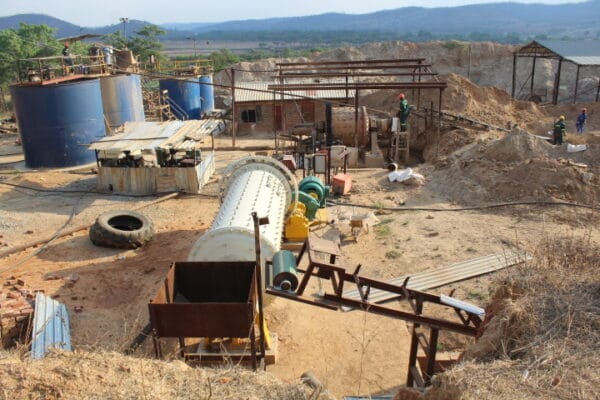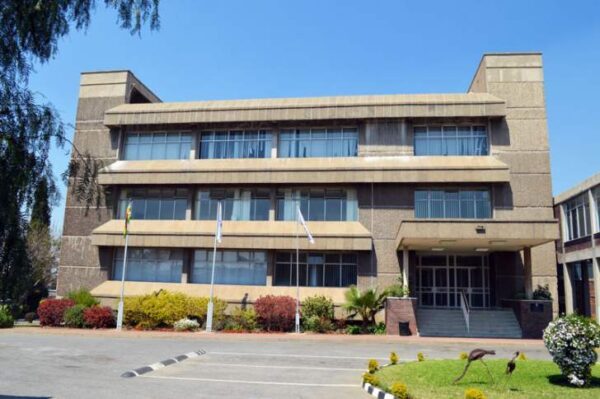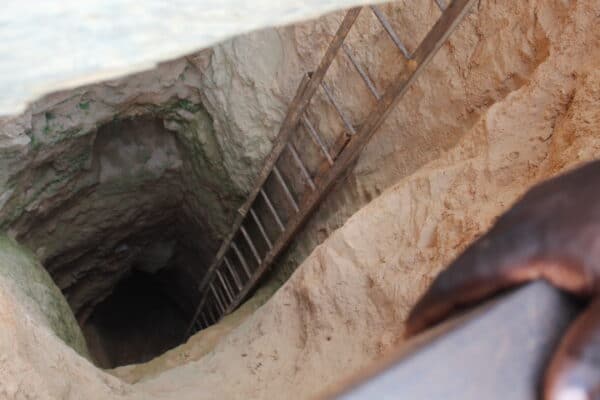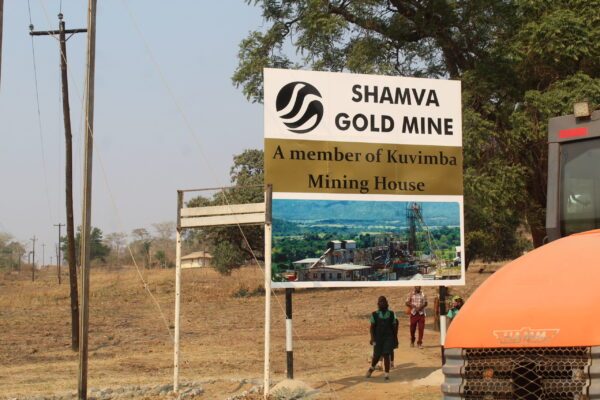Gold mining in Zimbabwe is a major mainstay for millions in the Southern African country.
There are over 4 000 recorded gold deposits in Zimbabwe of which nearly all of them are located on ancient workings. The country remains under-explored to discover deposits away from these ancient workings. More than 90% of gold deposits in Zimbabwe are associated with greenstone belts which are some of the richest in the world. Other gold deposits occur in the Limpopo Mobile Belt in the south of the country and in the Proterozoic Piriwiri rocks in the North-Western part of Zimbabwe.
Top large scale gold producing miners in Zimbabwe
Freda Rebecca
It mines 3,000 tonnes of ore and removes 8,000 banks of overburden on an average every day. The mine poured its first gold in April 1988. Freda is owned by Kuvimba mining house which owns a soon to be biggest gold producer Shamva gold mine.
Blanket Mine
One of Zimbabwe’s most successful mine, owned by New York Stock Exchange-listed Caledonia Mining Corporation, run by Steve Curtis the mine is currently carrying out an ambitious expansion drive aimed at producing 80 000 ounces of gold by 2021.
RioZim
Rio Zimbabwe, a diversified miner owns two gold mines which are Renco Mine and Cam and Motor Mine in Kadoma and many more scattered across the country.
Metallon Corporation
Metallon Corporation in 2015, gold production was 97,000 ounces and the target was 120,000 ounces in 2016. Across the group, Metallon has a significant resource base with a JORC-compliant 8.3 million ounce resource.
Sabi gold Mine
The mine employs about 450 employees and is currently serviced by one rectangular double compartment shaft reaching down to 15 metres below 12 level elevation. The Principal mining method is underhand stopping. The mine has the capacity to treat 450 tonnes of ore per day.
Falcon Gold (Falgold)
The company formerly owned Dalny mine in Chakari, Venice Mine in Kadoma and Golden Quarry mine in Shurugwi. Founded in 1991, Falcon Gold Zimbabwe is a subsidiary of the New Dawn Mining Group. New Dawn Mining Corp is involved in the exploration, development, extraction, processing and reclamation of precious metal deposits in Zimbabwe.
It primarily explores for gold, base metals and precious metals. Falcon Gold Zimbabwe Limited also has an operational processing plant and Ancillary infrastructure which supports a central processing plant that treats ore from Pickstone.
Pickstone Peerless
The 584ha Pickstone-Peerless Gold Mine is located 100km southwest of Harare and has historically produced over 400,000oz gold. Pickstone-Peerless has a current JORC Resource of 62 million tonnes grading 1.8 g/t, containing 3.56 million ounces of gold. Included in this Resource is an open-pittable Ore Reserve of 16.6Mt grading at 1.9 g/t for 1.02 million ounces of gold.
Duration Gold Mine
Duration Gold Limited offers gold exploration and production services. The company owns 5 core assets with historic production of 4.6 million oz. It also sells gold at international spot prices. The company was founded in 2006 and is based in Bulawayo, Zimbabwe. Duration Gold Limited operates as a subsidiary of Clarity Enterprises Limited.
One of its flagship gold mines is Vumbachikwe, which is one of Zimbabwe’s oldest gold mines.
Bilboes Holdings
Bilboes Holdings (Private) Limited owns and operates gold mines in Zimbabwe. It engages in mining, exploring, and producing gold. The company was founded in 1989 and is based in Harare, Zimbabwe.
Bilboes own and operates four gold mines namely Isabella, Bubi, When and McCay’s ‘existing mines’ all in the Bubi Greenstone Belt of Zimbabwe. The mines were acquired from Anglo American Corporation Zimbabwe Limited (AMZIM) in 2003 together with most of AMZIM’s gold mineral rights in Zimbabwe.
Eureka Gold Mine
Eureka Gold Mine is located about 150km north of Harare.
Eureka is a modern gold mine designed to produce up to 70,000oz of gold per annum from an open pit operation. Operations were suspended in 2000 due to high costs and low gold prices. The mine is currently on care and maintenance and the Company is focused on recommencing production in 2021.
Small-scale gold mining

Artisanal and Small-scale miners currently operating in Zimbabwe are estimated to range from 500 000 to 1 500 000 people.
This group is currently producing over 60% of gold submitted to the country’s sole buyer Fidelity Printers and Refiners (FPR).
The major challenges faced by the ASM sector are a lack of financial resources, equipment, expertise, and geological information. Despite these challenges, ASM operations remain crucial as production details recorded at Fidelity Printers and Refiners indicate that the sector has produced more than 60 tonnes (60%) of gold for the period 2017-2020.
Gold buying in Zimbabwe

Fidelity Printers and Refiners (Pvt) Ltd (FPR) is licensed to buy gold from large scale producers, small scale producers and holders of gold buying permits.
With FPR miners have an option to select the assay method for a particular deposit or the specific gravity method. If the customer opts for the fire assay method, payment will be made after the analysis which is carried out at the Head Office in Harare. Samples obtained after melting are accurately analysed using the internationally recognised fire assay technique. Results obtained are in the region of 1 part per thousand tolerances. However, for the specific gravity method, payment is actioned on the spot. The specific gravity method is used particularly in areas outside Harare.
FPR has decentralised its buying activities from Harare to cover the entire country, thereby significantly reducing the security risks associated with transporting gold for the small scale sector. The customer has an option to select the assay method for a particular deposit or the specific gravity method. Gold delivered to the centres is paid for on the spot after carrying out a specific gravity determination of the gold content. However, if the miner opts for the fire assay method, payment will then be made after the analysis which is carried out at the Head Office in Harare.
FPR is currently in the unbundling phase whereby new shareholders will be announced.
Fidelity Gold buying centres
FPR has decentralised its buying activities from Harare to cover all gold producing regions within the country, thereby significantly reducing the security risks associated with transporting gold over long distances. The company has also appointed Gold Buying agents to conveniently mop gold produced in outlying areas and also from artisanal miners.
The current gold buying centres are:
BULAWAYO
Address: ZB Bank Fife Street Branch Corner 10th Ave / Fife St
Phone: +263 292 880175/80, +263 292 68766
Email: [email protected]
GWANDA
Address: ZB Bank Shop No 8 NSSA Complex
Phone: +263 284 20957
Email: [email protected]
KADOMA
Address: ZB Bank No 42 Robert Mugabe Street
Phone: +263 68 212004
Email: [email protected]
MUTARE
Address: ZB Bank 88 Herbert Chitepo Street
Phone: +263 20 2061006
Email: [email protected]
BINDURA
Address: ZB Bank No 28 Robert Mugabe Way
Phone: +263 66 2106854
Email: [email protected]
GWERU
Address: ZB Bank No 69 Robert Mugabe Way
Phone: +263 54 2220328
Email: [email protected]
KWEKWE
Address: ZB Bank No 90 Robert Mugabe Way
Phone: +263 55 2526084
Email: [email protected]
ZVISHAVANE
Address: ZB Bank No 86 Robert Mugabe Way
Phone: +263 39 2353539
Email: [email protected]
CHINHOYI
Address: ZB Bank No 47 Magamba Way
Phone: +263 67 2121010
Email: [email protected]
FILABUSI
Address: Agribank 177 Mthwakazi
Phone: +263 84 2801527
Email: [email protected]
MASVINGO
Address: ZB Bank No 39 Robert Mugabe Way
Phone: +263 39 22265288
Email: [email protected]
Registering for gold mining claims in Zimbabwe

Gold mining is the most popular type of mining conducted in Zimbabwe. It has a flourishing market ready to pay the greenback on demand. Popular gold mining towns include Kadoma, Bindura, Shurugwi, Gwanda, Chegutu, Kwekwe, Zvishavane, Chinhoyi, Shamva and many other towns. Gold is found in every district in Zimbabwe!
The Ministry of Mines and Mining Development (MMMD) is tasked to promote sustainable exploration, mining, processing marketing and management of mineral resources for the benefit of all Zimbabweans. Its key responsibility is to be responsible for the administration of the Mines and Minerals Act (Chapter 21:05) of Zimbabwe.
Mining investment in Zimbabwe
1.1 Foreign Investors are allowed to own 100% shareholding for mining operations in all minerals except for platinum and diamonds which the foreign investor is expected to jointly own with Government on a 51%/49% basis.
1.2 Before starting operations the newly registered company should possess a Zimbabwe Investment Authority (Z.I.A) certificate and can then apply for a prospecting license from any Ministry of Mines and Mining Development Offices.
1.3 Any person who is a permanent resident of Zimbabwe and above the age of 18 may take out a prospecting license at any Ministry of Mines and Mining Development offices.
1.4 The Provincial Mining Director acting on behalf of the Permanent Secretary may refuse to issue a prospecting license but shall forthwith be required to report each refusal to the Secretary.
1.5 Each Prospecting License is valid for two years.
1.6 A holder of a Prospecting License automatically acquires the rights of prospecting and pegging mining claims anywhere in Zimbabwe.
1.1 When a Prospecting Licence holder has identified a mineral deposit that he/she is interested in, he/she appoints an agent or an Approved Prospector to peg on his behalf.
1.2 The agent is required to physically peg the area by marking the deposit with a Discovery Peg. He/She should also post Prospecting, Discovery and Registration Notices on the ground. The notices must be posted in a conspicuous manner to alert other prospectors.
1.3 Before posting these notices the agent is required to inform/or seek consent from the landowner of his intention to prospect.
NB: Consent is only sought from the landowner if prospecting on a farm less than 100 hectares, otherwise the prospector is only required to inform the farm/landowner in writing either by registered mail or deliver by hand.
1.4 All areas classified as not open to prospecting and pegging or reserved against prospecting and pegging cannot be pegged, e.g. cultivated lands, dip tanks, Dams, etc.
1.5 Each Prospecting License can peg up to a maximum of 10 claims at 1 Ha each.
1.6 An application for registration must be submitted to the Ministry of Mines and Mining Development offices. The application must have copies of the following attachments:
(a) Prospecting license(s).
(b) Prospecting Notice.
(c ) Discovery Notice (Base Minerals).
(d) Notification of intention to prospect to the landowner.
(e) A map in triplicate to the scale of 1:25000.
1.7 If the Provincial Mining Director is satisfied that all pegging procedures have been followed he shall issue a certificate of registration upon payment of the gazette fee. This allows the holder to start mining operations subject to meeting other obligations like Environment Impact Assessment (EIA).
1.8 Within three months from the date of registration the miner is required to erect permanent beacons on the ground.
1.9 All precious mineral claims are supposed to be continuously worked on in order to obtain renewal of title. Claims have a 12-month tenure after which they shall expire or be renewed.
1.10 Gold and other precious metal claims are inspected by production and capital expenditure.
1.11 Base metal claims can be protected by payment.
1.12 If a mining claim is transferred or sold a Certificate of Registration After Transfer shall be issued by the Ministry of Mines and Mining Development.
1.13 Failure to renew title will result in the forfeiture of a mining claim. Furthermore, loss of title can be through cancellation or abandonment.




